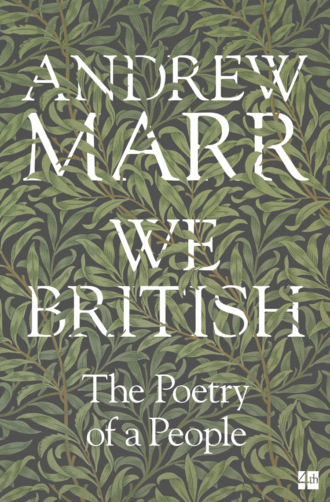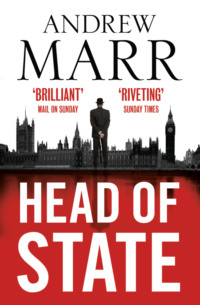
Полная версия
We British: The Poetry of a People
which once I saw in a dream here on earth,
will fetch me away from this fleeting life
and listening to the home of joy and happiness
where people of God are seated at the feast
in eternal bliss …
Here is a Warrior Christ, more like a Viking than a Hebrew figure, sitting down for a good old-fashioned feast – the early British didn’t have much to compare things to, beyond their own lives and culture.
What sustained them? Apart from the hope of heaven, the answer is the security of their extended families or clans: thirty-five distinct tribes were recorded around the time of Caedmon’s hymn. The most heavily populated areas were still the lowland farming territories, whose forests had been felled, and land ploughed, in prehistoric times. The Anglo-Saxon landscape was already old and heavily marked by the huge expansion of farming in the Bronze Age, and the burial mounds, castles and henges of earlier Britons. Caedmon’s people lived in a haunted landscape. Much of the infrastructure of Romano-British culture remained semi-intact. The new Saxon settlement of Lundenwic, just to the west of the walls of Roman Londinium, had well-built-up river embankments and trade facilities. To the north, towns such as Newcastle kept their Roman names well into the 400s; York was a well-established Christian centre from Roman times.
People lived in their local tribal polities, but they travelled widely. Saxon roads, unmetalled, have rarely survived, but Roman roads were still being heavily used, and archaeology confirms that there was a vigorous shipping economy and trade with the Continent. Whether trading, raiding or fishing, the Anglo-Saxon British were at least as much a seafaring race as the British of the time of Raleigh, or Nelson. Hardly any of their boats survive, for obvious reasons, but there are two substantial ships, one from the famous Sutton Hoo burial, and the other from Graveney in Kent. Modern reconstructions of these clinker-built vessels (that is, overlapping planks, pinned together) suggest that they could travel long distances at around ten knots, a considerable speed, using a coarse cotton sail. Though very different from the sleeker Viking longships, these Saxon vessels could also be rowed at speed up rivers and along coasts, and beached very easily. Large numbers of finds by archaeologists and amateurs using metal detectors show that Anglo-Saxon Britain traded extensively across the North Sea and the Channel. Discoveries of French and German pottery and glass, and Continental coins, confirm that this was a well-connected culture. In a famous poem, ‘The Seafarer’, here translated by the modern poet Ezra Pound, we get a vivid sense of what this really meant. Addressing the soft-living, wine-drinking landlubbers, the poet reminds them:
… how I in harsh days
Hardship endured oft.
Bitter breast-cares have I abided,
Known on my keel many a care’s hold,
And dire sea-surge, and there I oft spent
Narrow nightwatch nigh the ship’s head
While she tossed close to cliffs. Coldly afflicted,
My feet were by frost benumbed.
Chill its chains are; chafing sighs
Hew my heart round and hunger begot
Mere-weary mood. Lest man know not
That he on dry land loveliest liveth,
List how I, care-wretched, on ice-cold sea,
Weathered the winter, wretched outcast
Deprived of my kinsmen;
Hung with hard ice-flakes, where hail-scur flew,
There I heard naught save the harsh sea
And ice-cold wave, at whiles the swan cries,
Did for my games the gannet’s clamour,
Sea-fowls’ loudness was for me laughter,
The mews’ singing all my mead-drink.
Storms, on the stone-cliffs beaten, fell on the stern
In icy feathers; full oft the eagle screamed
With spray on his pinion.
Bringing luxuries from the Rhine and the Seine was hard and dangerous work. And through most of the Anglo-Saxon era, Scandinavian raiders and pirates were an ever-present threat. Even on dry land, what mattered most in this dangerous world was what matters most still in today’s colonised and harried societies, such as Iraq or Syria: a tight local network of kith and kin, to provide and sustain. Few things were scarier than exile, or losing your overlord. In ‘The Wanderer’, one of the great surviving poems of the period, it’s being excluded that really hurts:
… I had to bind my feelings in fetters,
often sad at heart, cut off from my country,
far from my kinsmen, after, long ago,
dark clothes of earth covered my gold-friend;
I left that place in wretchedness,
ploughed the icy waves with winter in my heart;
in the sadness I sought far and wide
for a treasure-giver, for a man
who would welcome me into his mead-hall,
give me good cheer (for I boasted no friends),
entertain me with delights.
Anglo-Saxon poetry harps (literally) again and again on the loss of warrior-comrades as if it’s the worst possible thing that could happen. There is remarkably little from a woman’s point of view. Anglo-Saxon women had greater property and legal rights than medieval women enjoyed, and some exercised considerable power, in monasteries and in the courts. The random destruction of literature means that we have only a single poem in a woman’s voice: it complains about the disappearance of a husband – apparently after some misbehaviour – leaving his wife to the brutal mercies of his family.
Early and late, I must undergo hardship
because of the feud of my own dearest loved one.
Men forced me to live in a forest grove,
under an oak tree in the earth-cave.
This cavern is age-old; I am choked with longings.
Gloomy are the valleys, too high the hills,
harsh strongholds overgrown with briars;
a joyless abode. The journey of my Lord so often
cruelly seizes me. There are lovers on earth,
lovers alive who lie in bed,
when I pass through this earth-cave alone
and out under the oak tree at dawn;
there I must sit through the long summer’s day
and there I mourn my miseries …
Along with the misery and mourning, the poet, then, understands that there are good married lives to be had. She has been forced out of her community, into the woods. We used to think of Anglo-Saxon Britain as being very heavily wooded. In fact, modern historians of the landscape tell us, much of the country had been opened up for farming for a thousand years or more.
There’s a strong sense in this poem of life being literally close to the earth, and surrounded by foliage. That’s an obvious separation from our lives today. Back then, even impressive towns were tiny and dangerous. Here is a fragment of an anonymous Anglo-Saxon poem about Durham, rare in being written after the Norman Conquest:
All Britain knows of this noble city,
its breathtaking sight: buildings backed
by rocky slopes appear over a precipice.
(And, particularly if you pass through by train, Durham is pretty much like that today. But hang on:)
Weirs hem and madden a headstrong river,
diverse fish dance in the foam.
Sprawling, tangled thicket has sprung up
there; those deep dales are the haunt
of many animals, countless wild beasts.
Archaeologists tell us that Anglo-Saxon Britain was studded with trading towns and urban centres huddled around churches, even if most of them, being made of wood and straw, have long disappeared. Durham, like York, got its sense of itself through the saints and missionaries buried there.
But what about the rest of the people? What sense of history did they have? Who did they think they were? We know we live in the twenty-first century. But by seven or eight centuries after the Roman legions had left, most British had no real sense of how their own history connected to that of the rest of mankind. There’s a wonderful eighth-century poem in which an Anglo-Saxon wanders through the ruins of Bath:
Wondrous is this stone-wall, wrecked by fate;
the city-buildings crumble; the works of the Giants decay.
Roofs have caved in, towers collapsed,
barred gates are broken, hoar frost clings to mortar,
houses are gaping, tottering and fallen,
undermined by age. The Earth’s embrace,
its fierce grip, holds the mighty craftsmen;
they are perished and gone.
So who were these craftsmen, who used techniques no longer understood, and built such walls? Wrongly, the Anglo-Saxon poet, himself a representative of the people who destroyed the Romano-British world, thinks they must have been destroyed by the plague, a contemporary problem; and he imagines them as being like bigger Anglo-Saxons – warriors bestriding courts where
… Once many a man
joyous and gold-bright, dressed in splendour,
proud and flushed with wine, gleamed in his armour …
Interesting, isn’t it, that passing reference to wine? But this Anglo-Saxon tourist is most impressed that these extraordinary people washed themselves, a pleasure which he almost salivates over:
Stone houses stood here; a hot spring
gushed in a wide stream; a stone wall
enclosed the bright interior; the baths
were there, the heated water; that was convenient.
They allowed the scalding water to pour
over the grey stone into the circular pool …
And in ‘The Seafarer’, the poem quoted earlier, we get a similar strong sense that the world has decayed since the great days of – presumably – the Romans. That poet speaks of:
Days little durable,
And all arrogance of earthen riches,
There come now no kings nor Cæsars
Nor gold-giving lords like those gone.
Howe’er in mirth most magnified,
Whoe’er lived in life most lordliest,
Drear all this excellence, delights undurable!
Waneth the watch, but the world holdeth.
Tomb hideth trouble. The blade is layed low.
This pessimism, so different from the Christian celebration of Caedmon, is something we should take with a pinch of salt. Anglo-Saxon Britain was full of advanced and sophisticated craftsmanship, from ornate goldwork to well-built ships and fine vellum books. No serious historian of the age now regards it simply as a time of anarchy and disaster. But if there is pessimism it is surely driven by politics – the restless, bloody tribal struggles that convulsed all of Britain, from the Picts in northern Scotland to the lands of the Jutes in southern England. Local warlordism isn’t much fun even for the warlords. It isn’t until the 800s, as the kingdom of the west Saxons pushed back against its Mercian, Northumbrian and Viking enemies, that the possibility of a dominant nation, an ‘England’, begins to emerge. Alfred the Great first managed to unite Wessex with Mercia, and then reached out until he could call himself the king of all the Anglo-Saxons. We know from a life written by the Welsh cleric Asser that Alfred was brought up on English poetry, though we don’t know what that was. As a ruler he was much more than a warlord, a highly ambitious and cultured figure, in touch with the latest developments on the Continent. Alfred personally oversaw the translation of key European Christian texts from Latin into English. He imported French and German men of letters. He began – almost, it seems, single-handedly – to forge a coherent English culture.
Despite the devastating effects of the Norse raids on monasteries, with their books, we might from this point have expected a steady growth and flowering of English poetry.
It didn’t happen. At least, it didn’t happen for another three centuries, again because of dynastic politics, in this case the unwanted arrival of those transplanted Vikings with their strange foreign tongue, the Normans. Eventually, the violent collision between Anglo-Saxon English and Norman French would produce a supple, flexible new language. But the hugely disruptive collision of the Conquest meant that there is a long gap after 1066 before we hear again the authentic voice of ordinary British people expressed in verse in their own language. No doubt it once existed. But it’s gone, and gone forever.
If the prose of the Anglo-Saxon Chronicle is to be believed, it would have been a poetry of lamentation. The Chronicle ends by describing the coronation of the man it calls simply Count William, who despite earlier promises ‘laid taxes on people very severely’. He and Bishop Odo then ‘built castles far and wide throughout this country, and distressed the wretched folk, and always after that it grew much worse. May the end be good when God wills!’
But there was more to this than the clash of Anglo-Saxons and Normans. Recent scholarly work points out that the pre-Norman Conquest court of Cnut, king of most of Scandinavia as well as England (and the Canute who mocked himself by ordering back the waves) and the court of Edward the Confessor were open to Danish, German, French and Latin learning. English queens were notable early sponsors of what became French literature. Britain in this period was very much part of Europe, and its dynasties were interlinked with those of France, Sweden and Hungary. The cowherds spoke Anglo-Saxon; but on the coasts and in the towns you would have heard a chatter of Norse, Latin, French – and Welsh too. For the people speaking the old British or Celtic languages hadn’t gone away. What was their poetry like? Mostly oral, of course, and therefore mostly lost, of course. We have infuriatingly few fragments to go on, but there is an Irish poem about a fair in County Wexford, around the time of the Norman Conquest, which gives some idea of early non-English poetry in these islands:
There are the Fair’s great privileges:
trumpets, harps, hollow-throated horns,
Pipers, timpanists unwearied,
poets and meet musicians.
Tales of Find and the Fianna, a matter inexhaustible,
sackings, forays, wooings,
tablets, and books of lore,
satires, keen riddles:
Proverbs, maxims …
… The Chronicle of women, tales of armies, conflicts,
hostels, tabus, captures …
Pipes, fiddles, gleemen,
bone-players and bag-pipers,
a crowd hideous, noisy, profane
shriekers and shouters.
They exert all their efforts
for the king of seething Berba:
the King, noble and honoured,
pays for each art its proper honour.
That’s a translation, of course, by Professor Thomas Owen Clancy of Glasgow University. He makes it sound great fun – like a modern literary festival on acid. Not everybody in the so-called dark ages was having a miserable time.
Конец ознакомительного фрагмента.
Текст предоставлен ООО «ЛитРес».
Прочитайте эту книгу целиком, купив полную легальную версию на ЛитРес.
Безопасно оплатить книгу можно банковской картой Visa, MasterCard, Maestro, со счета мобильного телефона, с платежного терминала, в салоне МТС или Связной, через PayPal, WebMoney, Яндекс.Деньги, QIWI Кошелек, бонусными картами или другим удобным Вам способом.







